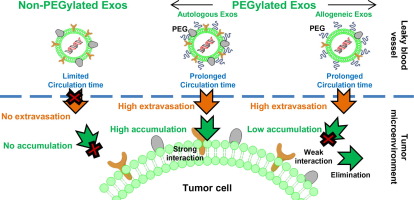European Journal of Pharmaceutics and Biopharmaceutics ( IF 4.4 ) Pub Date : 2019-10-17 , DOI: 10.1016/j.ejpb.2019.10.005 Sherif E. Emam , Amr Selim Abu Lila , Nehal E. Elsadek , Hidenori Ando , Taro Shimizu , Keiichiro Okuhira , Yu Ishima , Mahmoud A. Mahdy , Fakhr-eldin S. Ghazy , Tatsuhiro Ishida

|
Exosomes are gaining increasing attention as drug delivery vehicles due to their low toxicity and ability to functionally transfer biological cargos between cells. However, the therapeutic applicability of exosomes is partially hampered by a lack of cell-type specificity. In this study, therefore, we investigated the impact of cell-type tropism on the in vivo systemic delivery of exosomes to tumor tissues. Exosomes derived from murine colorectal cancer cells (C26) (C26-Exos) and murine melanoma cells (B16BL6) (B16BL6-Exos) were collected. In vitro cellular uptake of either autologous (C26) or allogeneic (B16BL6) exosomes by C26 tumor cells was determined. In vivo tumor accumulation of each type of exosomes in mice bearing C26 tumors was monitored with an in vivo imaging system (IVIS). In in vitro studies, autologous C26-Exos were more efficiently taken up by C26 cancer cells, compared to allogeneic B16BL6-Exos. For in vivo studies, exosomes were modified with surface polyethylene glycol (PEG) to improve their circulation lifetimes. Although both types of PEGylated exosomes accumulated in C26-tumor tissue, autologous exosomes were preferentially accumulated within C26-tumor tissue compared to allogeneic exosomes. The increased tumor accumulation of autologous PEGylated exosomes was accompanied by the preferential uptake of exosomes by not only C26-tumor cells but also tumor-associated immune cells. This study implies that cancer cell-type tropism is an important factor in the achievement of tumor cell targeting with cancer cell-derived exosomes.
中文翻译:

癌细胞类型的向性是将癌细胞派生的外泌体有效地系统递送至肿瘤组织的关键决定因素之一
外来体由于其低毒性和在细胞之间功能性转移生物货物的能力而作为药物递送载体而受到越来越多的关注。然而,由于缺乏细胞类型的特异性,外泌体的治疗适用性受到了部分阻碍。因此,在这项研究中,我们研究了细胞型向性对外来体向肿瘤组织的体内全身递送的影响。收集来自鼠类结肠直肠癌细胞(C26)(C26-Exos)和鼠类黑色素瘤细胞(B16BL6)(B16BL6-Exos)的外来体。确定了C26肿瘤细胞对自体(C26)或同种异体(B16BL6)外来体的体外细胞吸收。用HPLC监测携带C26肿瘤的小鼠中每种外体的体内肿瘤积累。体内成像系统(IVIS)。在体外研究中,与同种异体B16BL6-Exos相比,自体C26-Exos被C26癌细胞吸收的效率更高。对于体内研究表明,外泌体被表面聚乙二醇(PEG)修饰以延长其循环寿命。尽管两种类型的PEG化外泌体均积累在C26肿瘤组织中,但是与同种异体外泌体相比,自体外泌体优先积累在C26肿瘤组织内。自体聚乙二醇化外泌体的肿瘤积累增加伴随着外泌体的优先摄取,不仅是C26肿瘤细胞而且是肿瘤相关免疫细胞。这项研究表明,癌细胞类型的向性是实现癌细胞衍生的外来体靶向肿瘤细胞的重要因素。











































 京公网安备 11010802027423号
京公网安备 11010802027423号